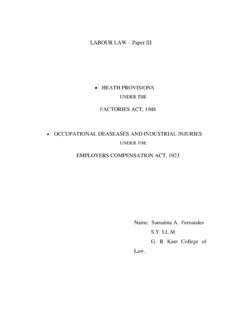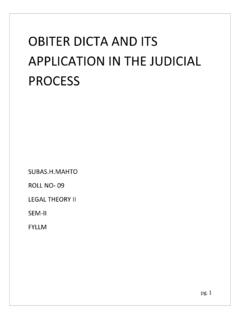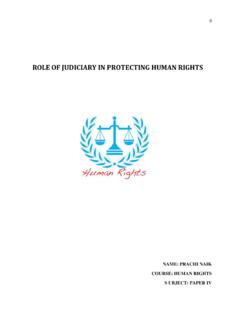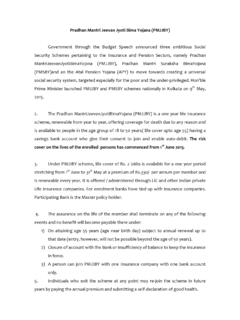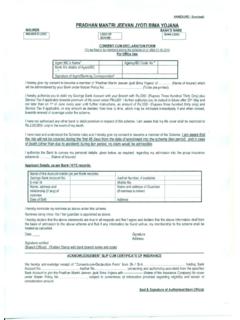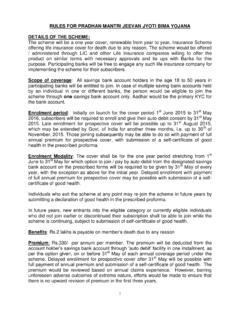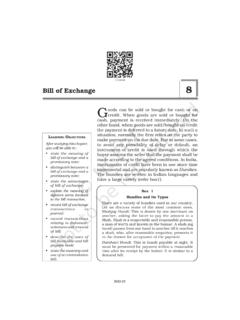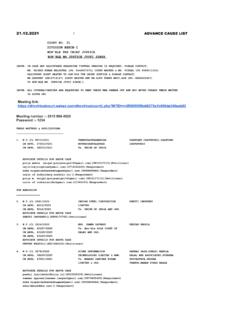Transcription of ROSCOE POUNDS ON SOCIOLOGICAL JURISPRUDENCE.
1 1 ROSCOE POUNDS ON SOCIOLOGICAL JURISPRUDENCE. MISS- jyoti RAMAKANT NAVELKAR LLM. SEMESTER- I PAPER-LEGAL THEORY PART-I G. R KARE COLLEGE OF LAW. 2 CON tENtS Name Pg. No. A} INTRODUCTION 3 -5 B} ROSCUE POUND THEORY 6-15 C} CRITICISM AGAINST POUND THEORY 16-19 BIBILOGRAPHY 20 3 CHAPTER-I INTRODUCTION ROSCOE pound was born on October 27, 1870, in Lincoln Nebraska toStephen Bosworth Pound and Laura studied botany at the University of Nebraska in Lincoln, where he became a member of Acacia Fraternity. He received his Bachelor s degree in 1888 and his master degree in 1889. In 1889 he began the study of law, he spent one year at Harvard but never received a law degree.
2 He received the first in botany from the University of Nebraska in 1898. He was an Auxiliary judge of the supreme court of Nebraska for a period of two years during 1901 -1903. Thereafter, he worked as Dean of the Law School at Nebraska. He also served as a professor of Jurisprudence in Harward University and was the Dean of its law school. He was a profile writer and his major works includes- The spirit of the common Law (1921); An introduction to the Philosophy of Law(1922); Interpretations of legal history (1923); Law and Morals(1926); The formative era of the American Law (1938); Contemporary juristic theory(1940); Administrative Law-its Growth , procedure and significance(1942); Social control through law (1942); The task of law (1944) etc. 4 ROSCOE pound was one of the most leading and influential jurists who developed the American SOCIOLOGICAL jurisprudence in a systematic form.
3 He emphasised on inter disciplinary approach to law so that rule of law and life may flow together. He treated law as a means for affecting social control and did not believe in the abstract or mechanical application of law. He is considered to be the father of American SOCIOLOGICAL Jurisprudence for his unique contribution to the science of law and legal philosophy. The emergence of Realist School in America in later years owes its origin to Pound s functional jurisprudence and theory of interests. During the 19th century the concept of police state began to wither away and the concept of welfare state took precedence due to rapid increase in population, social revolutions leading to social unsettlement. Analytical positivism in such matters failed to meet the demands of social stability giving way to SOCIOLOGICAL approaches of law.
4 SOCIOLOGICAL jurisprudence a part of sociology (the science of social order and progress) predicts and prescribes social behaviour, led to the distinction between a legal sociologist and SOCIOLOGICAL jurist. ROSCOE Pound's theory of SOCIOLOGICAL jurisprudence, firstly talks of a factual study, secondly social investigations, thirdly just andreasonable solutions and lastly the achievement of the purposes of various appreciatedthe task of lawyer to that of an engineer to build an efficient structure of society with the satisfaction of the maximum of wants with a minimum of friction and waste. It speaks about balancing of conflicting interests or defactor claims wherein the interests are categorised into individual public and social. The theory gives predominance to social interests as compared to public and individual interests.
5 SOCIOLOGICAL Jurisprudence according to pound should ensure that the making interpretation and application of laws take account of social facts. Towards achieving this end there should be- a) A factual study of the social effects of legal administration, 5 b) Social investigations as preliminaries to legislation, c) A constant study of the means for making laws more effective, which involves, d) The study, both psychological and philosophical, of the judicial method, e) A SOCIOLOGICAL study of legal history, f) Allowances for the possibility of a just and reasonable solution of individual cases g) A ministry of justice in English Speaking countries, and h) The achievement of the purpose of the various laws. 6 CHAPTER II ROSCOE POUND THEORY Pound is the most systematic writer on the SOCIOLOGICAL jurisprudence.
6 POUNDS concentrated more on the functional aspect of law. That is why some writers name his approach as functional school. For pound, the law is an ordering of conduct, so as to make the good of existence and the means of satisfying claims go round as far as possible with the least friction and waste with a minimum of friction. LAW AS PURPOSIVE AND NEED-BASED ROSCOE Pound s concept of law is of practical importance which inspires judges, legislators and jurists to mould and adjust law to the needs and to interests of the community. Since the society is always changing law should be continually adapted and readapted to the needs of individuals and society. He, therefore, stresses the need of paramount co-ordination and co-operation between the legislators, administrators, judges and jurists to work in unison towards the realisation and effective implementation of law for securing social harmony and social justice to the general public with the a minimum of waste or friction and maximum of material satisfaction of wants, needs and interest.
7 THEORY OF INTEREST (JURISPRUDENCE OF INTERESTS) Ihering expounded the concept of Jurisprudence of interestsquite opposed to jurisprudence of conceptions the later had made law rigid, logical and purely formal without content. The theory of jurisprudence of interests is based on functional study of man, and society to secure and satisfy needs or demands of the community. Earlier to him Jeremy Bentham had tested every institution or law on the matrix of utility. A supplementary theory of interests to that of 7 Inhering was further developed, by pound who in turn further borrowed this idea from Williamjames , and john dewey . Pound like Bentham tested the justification of law withreference to protection and enforcement of social and individual claims.
8 In other words, pound creates the test: Does it secure the greatest number of interest with least possible sacrifice of other interests? In POUNDS words 'An interest is a demand or desire which human beings either individually or in groups seek to satisfy, of which, therefore, the ordering of human relations in civilised society must take account. 'The law does not create interests. It classifies them and recognises a larger or smaller number; it defines the extent to which it will give effect to those which it recognises, in view of (a) other interests, (b) thepossibilities of effectively securing them through law; itdevises means for securing them when recognised and within determined limits'. THE CONTRIBUTION OF ROSCOE POUND The contribution of ROSCOE pound to SOCIOLOGICAL Jurisprudencemay be studied under the following heads- 1.
9 EMPHASIS ON FUNCTIONAL ASPECT OF LAW- 2. POUND S THEORY OF SOCIAL ENGINEERING- i. Private interests ii. Public interests iii. Social interests 3. JURAL POSTULATES OF ROSCOE POUND i. jural postulate i- ii. jural postulate-ii iii. jural postulate-iii iv. jural postulate-iv- v. jural postulate-v. 8 1. EMPHASIS ON FUNCTIONAL ASPECT OF LAW: ROSCOE pound added new dimensions to SOCIOLOGICAL schoolof Jurisprudence. His approach to SOCIOLOGICAL Jurisprudence was different in the sense that he attempted to cover social life as a whole unlike his predecessors who considered law as the main subject of study and society is merely subsidiary to it. Pound laid greater stress on functional aspect of law. He defined law is the containing the rules , principles, conceptions and standards of conduct and decision as also the precepts and doctrines of professional rules of art.
10 He thus considers law as ameans of a developed technique and treats jurisprudence as a social engineering . The end of law according to him is to satisfy a maximum of wants with a minimum of friction or confrontation. Elaborating the functional aspect of law, ROSCOE pound stated that the function of law is to reconcile the conflicting interest of individuals in the community and harmonise their inter-relations. He termed this as social Engineering . 2. POUNDS THEORY OF SOCIAL ENGINEERING: ROSCOE pound conceived law as a social Engineering its main task being to accelerates the process of social ordering by making all possible efforts to avoid conflicts of interest of individuals in the society . Thus courts, legislators, administrators and jurists must work with a plan and make an effort to maintain a balance between the competing interests in society.
